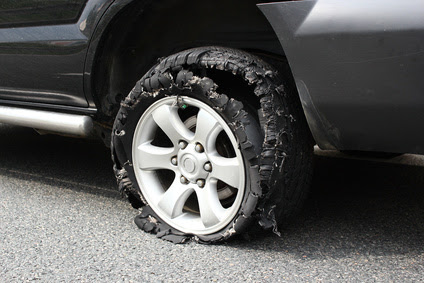It doesn’t matter whether you are driving across town to the grocery store or across the country for a vacation, a flat tire is one of those things that can take your great day and make it a terrible one. The good news is that flat tires can be prevented in many cases with a few preventative measures and maintenance.
Here are four things that you can to do to help prevent a flat tire from occurring when you least expect it.
- Keep an Eye on Your Tire Pressure
Your vehicle’s tires need to be properly inflated at all times to help prevent a flat tire and even a blowout. A tire pressure gauge should be used to check all four of your tires, as well as your spare, at a minimum of once a month — although you can check them more regularly than this if you would like. The recommended tire pressure can be located in your vehicle’s manual or on the inside of the driver’s door.
When you take a tire pressure reading, make sure to do so after your vehicle has been sitting for at least a couple of hours. Otherwise, you may get an inaccurate reading from the tires being warm from driving on the road.
Also, keep in mind that even though your vehicle may have a tire pressure monitoring system, the warning light often doesn’t come on until the tire is significantly underinflated. Therefore, do not solely rely on this system to prevent flat tires. Take the time to check your tires yourself.
- Rotate Your Tires on a Regular Basis
When your tires are not rotated on a regular basis, they can suffer uneven wear patterns. When this happens, the tires can wear down prematurely, requiring replacement sooner than necessary.
Your owner’s manual should let you know how frequently your tires need to be rotated, but average recommendations are between 5,000 and 10,000 miles. A good rule of thumb is to have your tires rotated with every oil change.
- Avoid Road Hazards
Whenever possible, you should avoid hazards on the road as these can create punctures in your tires, resulting in flat tires or blowouts. Of course, it is sometimes challenging to avoid hazards if they are large or difficult to see, such as potholes, nails, sharp rocks, or glass.
However, when you know there is an active construction zone or a road that is not maintained by the city or county, try to avoid driving in that area.
When you hit a pothole, it doesn’t only do harm to your tires and wheels, but it can also damage additional parts of the vehicle. Keep a close eye on your tires. If you detect any bulges or cracks, the damage could be from hitting road hazards.
If your tires were underinflated when you ran over these things, your tires are often more at risk of damage, which is another reason why proper tire pressure is so important.
- Watch Out for Tire-Related Recalls
Just like vehicles and other products, tires can be recalled by manufacturers. Therefore, in some cases, the potential hazards that tires pose may be far beyond your control. Familiarize yourself with the brand, type, and size of your tires so that you can keep a watch out for manufacturer recalls related to your tires as well as your vehicle.
There is no 100 percent guarantee that you will never experience a flat tire, but the aforementioned are some things that you can do to help prevent a flat tire. If you do encounter a flat tire and need a new one, contact the professionals at Evans Tire & Service Centers.

